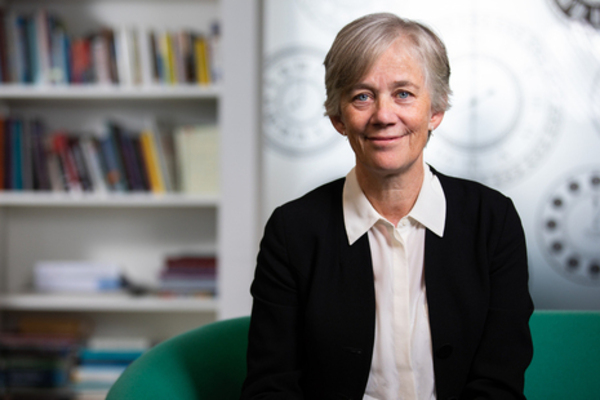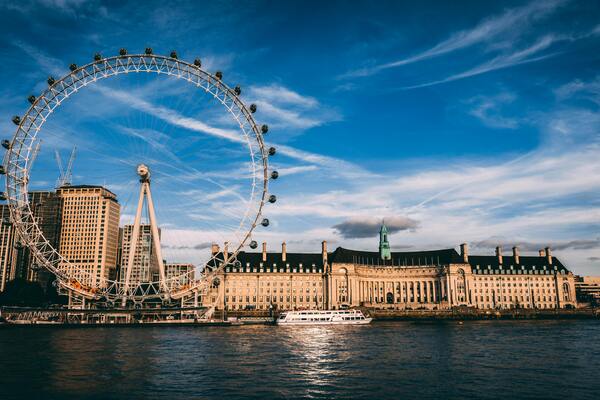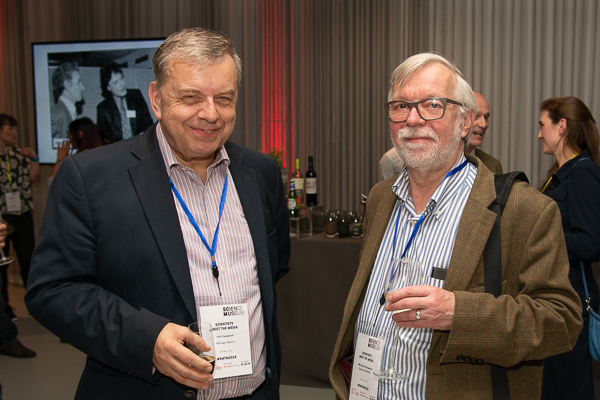Dame Angela McLean reflected on her first year as Government Chief Scientific Adviser (GCSA UK) and Head of the UK Science, Engineering and Technology profession, in conversation with Pallab Ghosh, BBC Science correspondent. She defined her goals for her time in the post, saying 'I am a scientist at heart, the first woman in the role, and I don't plan to be the last’. The ABSW special event took place at the Science Museum on 9th May 2024.
McLean explained how her role advising the prime minister is supported by her office ‘GO-Science’ and draws on a network of CSAs. These are fixed-term positions, where academics step into government, with one in most departments. She recognised that at times, for her scientific colleagues this can feel like 'being a stranger in a strange land', where politicians have different sensitivities, but it ‘works surprisingly well.’
The relationship between science and government strengthens when ‘civil servants feel happy to ask scientific questions, and scientists are prepared to explain’, McLean states. Networking cultures also differ, with the government using brief phone communications compared to lengthier academic interactions. It would be beneficial if politicians and civil servants took part in more in-depth discussions with scientists.
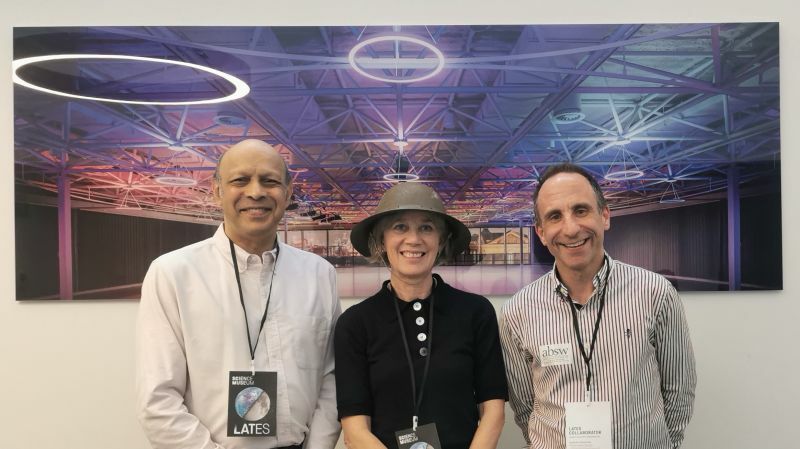
Dame Angela McLean (in the middle) wearing a tin hat invented by the first GCSA, Solly Zuckerman. (As you are looking at the image) Andy Extance, ABSW chair, on her left side and Pallab Ghosh, BBC Science Correspondent, on her right side.
The Science and Technology (SNT) Framework is a ten-point plan for the UK to reach 'Science Superpower' status by 2030. McLean sees this as essential for the country to continue prospering. She urged that ‘we need to work very hard not to get overtaken because we will soon stop extracting hydrocarbons’. She hinted that the economic model of a primary financial capital in London may be shifting to become more distributed.
Alongside excellent organisation, the UK's scientific strategic advantage is fundamental to the plan. This looks at the entire system where ideas flow from the laboratory towards becoming products. ‘The government acknowledges that making this journey a success, relies on collaboration, especially across its departments,’ McLean said.
Comparing data sets about technologies in different countries shows that the UK creates plenty of spin-out companies, but does not excel in the longer term. Previously, ‘the UK has been very good at science but less so at making money,’ McLean said. Considering the issues and solutions, she concluded that a low-risk 'good enough' strategy doesn't allow spin-outs to grow. New funding has been introduced to address this, and there is now a program to turn science into wealth with a whole systems approach and optimism across government.
Exploring the links between ideas and wealth is important, McLean said. In terms of education, allowing different people to have their own ideas is unique to the UK and we should consider how entrepreneurship is taught and valued, she added. Learning is needed about 'Open Science' and the tension between that and the way we invest in intellectual property protection, with the recognition that national prospects and security are important for well-being.
The UK GCSA is Chair of the UK Government's Science Advisory Group for Emergencies (SAGE). It is responsible for national security and resilience. McLean sees it as a priority for her role to ensure it can be convened rapidly at any time to gather clear scientific evidence in an emergency.
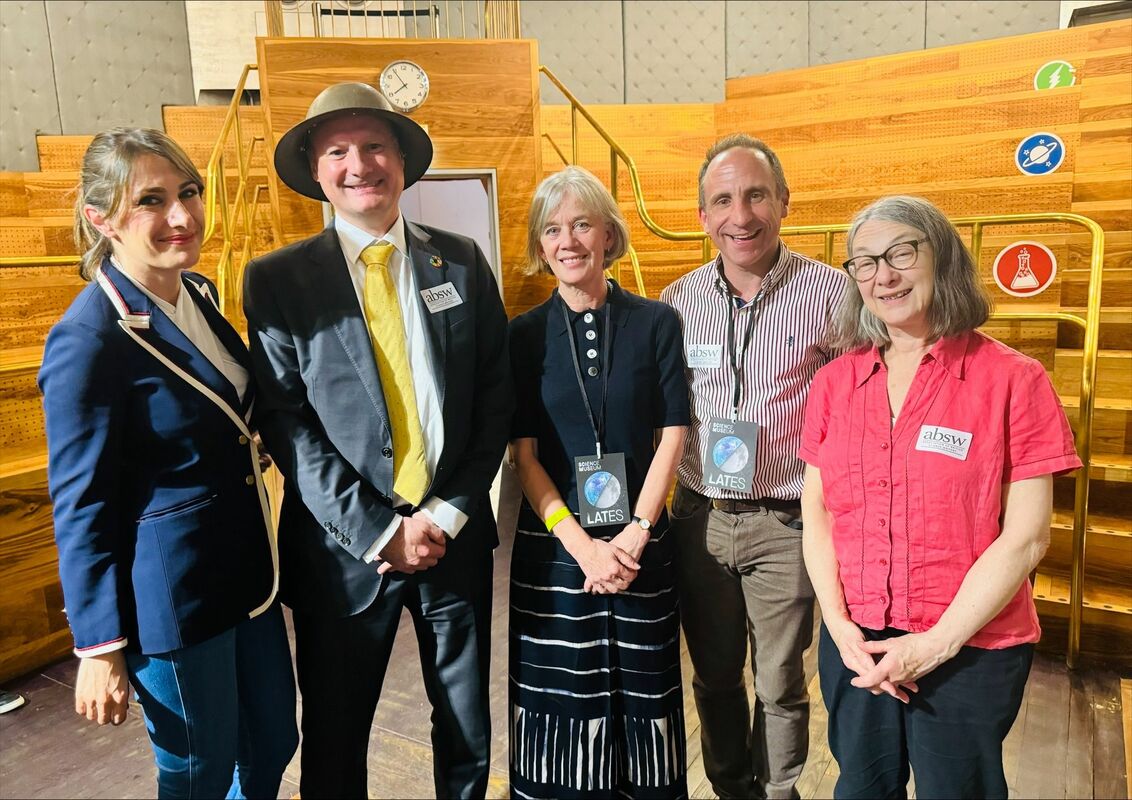
(From the left side of the image) Alex O'Brien (ABSW vice-chair), Bob Ward (ABSW Board member), Dame Angela McLean (UK GCSA), Andy Extance (ABSW chair) and Deborah Cohen (ABSW Secretary), at Science Museum 'Lates' special event.
Thinking about scientific questions for today and tomorrow, McLean is looking forward to what comes next. She selected the Engineering Biology interface, Artificial Intelligence and Quantum as priority technologies where the UK can be a strong player. We need to be a 'quantum ready' economy to turn this technology into a product. We don't yet know what we need for AI regulation. Such regulation would be better at the global level for it to be effective and avoid the UK appearing tech-averse.
Finally, McLean called for more scientists in the senior civil service. Going forward, improving mathematics and numeracy taught in UK schools is important for both science and government. These skills, together with the ability to explain yourself well, are not likely to disappear, whatever the future holds for science. Making sure girls have full access to them can increase the representation of women in science.
'The most important thing we can do to support women in science is to make sure women are part of the conversation,' said McLean.
Highlighting the range of careers open to the scientifically qualified beyond traditional stereotypes might encourage more women to take up Science, Engineering and Medicine. Internationally, there is a strong 'five eyes’ intelligence collaboration between the UK, the US, Canada, Australia and New Zealand, all of which currently have female GCSAs. Publicising this can make women believe that they can do it.

